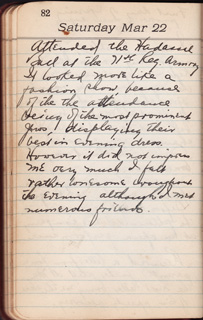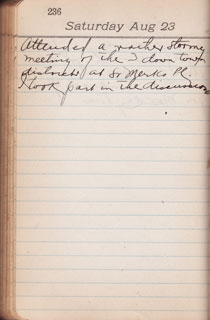
In a cold night my helper
refused to distribute the
circulars for the mass meeting
that I am calling. I stood
alone in the terrible weather
distributing them doing it
lovingly knowing the respons-
ibility that rests on my shoulders
when Dr. Bernstein passed
me on his way to lecture for
the Zeire Zion.
He did not feel like speaking
but seeing my sacrifice he
got inspired and delivered
his best, he told me.
Later I joined him at the
Z.Z. So I unconsciously
served some purpose
I saw there a girl
that is good.
——————
Matt’s Notes
It got down to 7° on the night of January 26, 1924 (oddly, we’ve had the same kind of sudden temperature drop on January 26, 2007) so I can understand why Papa’s helper left him in the lurch. Understanding is not forgiving, though, so I hate the old bastard, wherever he is. I think Papa, who had been worried about the prospects for his January 28th meeting for a while, wasn’t in a forgiving mood, either — he notes how he “lovingly” continued to shoulder his responsibilities, contrasting himself rather pointedly with certain would-be helpers who weren’t quite so loving and responsible.
I’m sure Papa didn’t distribute many fliers on that biting, snowy night. Any people on the street must have rushed by, chins tucked to their chests, hardly inclined to stop for the earnest young man who waved papers at them and said something about something coming up on Monday. Such young men were all over the place. Who could tell them apart?
I can’t keep the Zionist varieties straight myself, but I think Zeire-Zion, Dr. Bernstein’s organization, had a Zionist-Socialist agenda. I’m not clear on whether they thought the Jewish state would be a nice little place for socialist experiment or a glorious staging ground for a global socialist victory (the Zionist-Socialist movement was, not surprisingly, factional as well) and I may well have the whole movement entirely wrong, so please correct me if you know better.
As a labor activist himself Papa would have had some affinity for the Zionist-Socialists, but he wouldn’t have stood out in the cold for them. Papa worked for the Zionist Organization of America and its related organizations, which concentrated on organized fundraising for business investment and land purchases in Palestine. The ZOA had its own internal philosophical clashes, but socialism wasn’t in the mix.
Anyway, Papa gave Dr. Bernstein a boost and met a “girl that is good” at the Zeire-Zion meeting, so the night, as they say, wasn’t a total loss.








